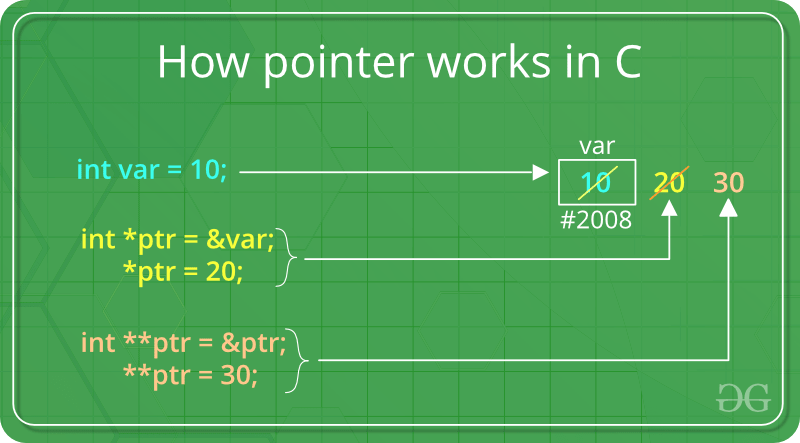Mastering Pointers in C: A Comprehensive Guide to Understanding and Leveraging Pointers Effectively

Introduction: Pointers are a powerful and fundamental feature of the C programming language, allowing you to work with memory addresses and manipulate data directly. While pointers can be challenging to grasp initially, mastering their use is essential for writing efficient, flexible, and high-performance C code. In this comprehensive guide, we’ll explore everything you need to know about pointers in C, including their basics, syntax, common operations, advanced techniques, and best practices. By understanding and leveraging pointers effectively, you can unlock the full potential of the C programming language and become a more skilled and versatile programmer.
- Understanding Pointers: At its core, a pointer in C is a variable that stores the memory address of another variable. Instead of directly storing data, pointers store the address of where the data is located in memory. This allows you to indirectly access and manipulate data, making pointers a powerful tool for dynamic memory allocation, data structures, and low-level programming tasks.
- Basics of Pointers: To declare a pointer variable in C, you use the asterisk (*) operator followed by the data type of the variable it points to. For example:
int *ptr; // Declare a pointer to an integer
To initialize a pointer variable with the address of another variable, you use the address-of (&) operator. For example:
int x = 10;
int *ptr = &x; // Initialize ptr with the address of x
To access the value stored at the memory address pointed to by a pointer, you use the dereference (*) operator. For example:
int x = 10;
int *ptr = &x; // Initialize ptr with the address of x
printf("Value of x: %d\n", *ptr); // Output: Value of x: 10
- Common Operations with Pointers: Pointers in C support various operations and functionalities, including:
- Pointer arithmetic: You can perform arithmetic operations on pointers, such as addition, subtraction, increment, and decrement. Pointer arithmetic is scaled based on the size of the data type the pointer points to.
- Pointer comparison: You can compare pointers using relational operators (<, <=, >, >=) to determine their relative positions in memory.
- Pointer assignment: You can assign one pointer variable to another, allowing you to manipulate multiple pointers to the same data.
- Pointer arrays: You can create arrays of pointers, allowing you to store and manipulate multiple pointers in a single data structure.
- Advanced Pointer Techniques: In addition to basic operations, pointers in C can be used for more advanced techniques and applications, including:
- Dynamic memory allocation: Pointers are commonly used to allocate and deallocate memory dynamically at runtime using functions like malloc(), calloc(), realloc(), and free().
- Pointer to functions: Pointers can be used to store the address of functions, allowing you to pass functions as arguments to other functions or store them in data structures.
- Pointers to structures: Pointers can point to structures, allowing you to access and manipulate members of structures dynamically.
- Pointer casting: Pointers can be cast to different data types, allowing you to reinterpret the underlying memory and perform type conversions.
- Best Practices for Using Pointers: To ensure safe and effective use of pointers in C, consider following these best practices:
- Initialize pointers: Always initialize pointers before using them to avoid accessing uninitialized memory.
- Check for NULL: When working with dynamically allocated memory, always check if pointers are NULL before dereferencing them to prevent null pointer dereference errors.
- Avoid pointer arithmetic pitfalls: Be mindful of pointer arithmetic and ensure that operations are performed within the bounds of valid memory regions to avoid undefined behavior.
- Free dynamically allocated memory: Always free dynamically allocated memory using the free() function when it is no longer needed to prevent memory leaks.
- Use meaningful pointer names and comments: Use descriptive variable names for pointers and include comments to document their purpose and usage to improve code readability and maintainability.
- Conclusion: In conclusion, pointers are a fundamental aspect of the C programming language, offering powerful capabilities for working with memory addresses and manipulating data directly. By understanding the basics of pointers, mastering common operations, exploring advanced techniques, and following best practices, you can harness the full potential of pointers in C and write more efficient, flexible, and reliable code. Whether you’re working with dynamic memory allocation, data structures, or low-level programming tasks, pointers provide the tools you need to tackle complex problems and optimize performance. So embrace pointers in C, practice these techniques, and elevate your programming skills to new heights.




